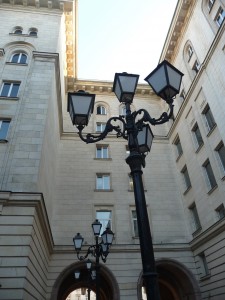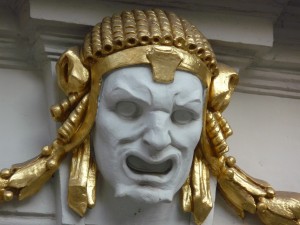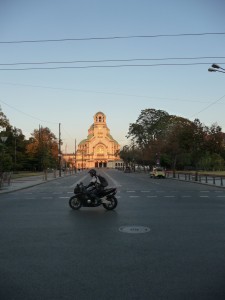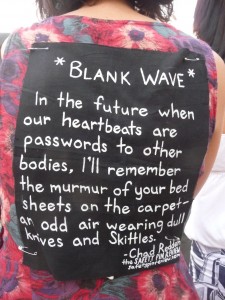
In-bowl taps in the toilets replaced with paper, church bells instead of azaan, and on the road to Sofia every other kilometre a stoned-looking woman who forgot to put her clothes on, advertising things as diverse as hotel rooms, soft drinks, and hunting rifles.
Riding into Bulgaria’s capital Sofia was a strange déja-vu. I’ve been told its grandiose neo-classical style is typical for the communist era (the city was bombed badly during WW II); to me it first of all looks European. Familiar brands of cars (and the odd Lada and odder Trabant) glide through the streets, gallantly stopping for anyone who so much as looks at a zebra crossing. I’ve reached a different part of the world. (The taxis are still yellow, though. Since when have there been yellow taxis? Iran?)
Even the weather has changed – on my way from Plovdiv to Sofia the forests were turning yellow and the evenings are chilly now. Summer is on its way out, the exotic part of my trip is over, from now on everything is much more familiar.
All that said, I’m looking forward to the different flavours of Europe I’ll encounter on my way up. So far, one surprising feature of the Bulgarians is their use of the Indian headshake for “yes”. And that while I’d just gotten used to the Iranian and Turkish meaning of a very similar gesture, a quick shake combined with an irritated frown, meaning “I beg your pardon, say again?” The throwing-back of the head still throws me off – with or without a sharp tongue-click, this gesture, so close to what I understand as “yes”, means “no”. To add to this happy diversity, the same gesture in India means “I beg your pardon, say again?”. Still following? All I’m saying is that Milan Kundera’s theory of how gestures use people to express themselves, however charming, might not be the full story after all.



| I spent a few pleasant days wandering around Sofia’s cobblestoned centre. Found some CDs by Theodosii Spassov and finally an interesting book again (Emine Sevgi Özdamar’s The Bridge of the Golden Horn finished long ago), Eco’s The Prague Cemetary. Should be a good preparation for my journey through the dark heart of Europe. But first I’ll have another go at finding the frenzied rhythms in 13/9 that I looked for in Sofia in vain. Belgrade, Serbia, here I come! |

Ha Robbert,
je komt al aardig in de richting! Inderdaad weer heel Europees wat je allemaal ziet in Sofia. Kalina Bogoeva, die twee weken geleden bij ons was in de studio om een docenten workshop te geven. heeft haar eigen school in Sofia:
http://www.foundationbogoeva.com
maar waarschijnlijk ben je alweer verder.
Je krijgt veel groeten van ons, we kijken ernaar uit je weer te zien en je te horen. Wanneer denk je weer aan de slag te gaan hier in Amsterdam? Niet om je op te jagen, maar het is jammer als alle lessen al vergeven zijn tegen de tijd dat je weer beschikbaar bent.
Geniet van de laatste kilometers.
Ik heb je webadres doorgegeven aan een slagwerkster die mogelijk volgend jaar een poos in India gaat wonen, haar man Johannes geeft incidenteel les bij ons.Zou leuk zijn je een keer voor zijn lessen te laten spelen…
heb het goed,
Ineke